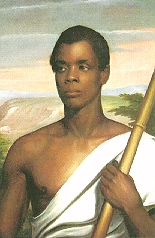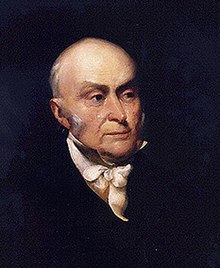Amistad trials

The Amistad Trials were several trials from 1839 to 1841 against prisoners on the Amistad ship . The trials are seen as an essential step towards the abolition of slavery in the United States .
The Amistad was a Spanish flag cargo ship that took slaves on board in Cuba in 1839 . In a rebellion, the entire crew except for two crew members was killed by West African prisoners. The leader of the revolt was Sengbe Pieh of the Mende people . The slaves reached the coast of the United States independently, where they were brought up and imprisoned by the US Navy .
The slaves were charged with mutiny and murder . After an appeal , sought by incumbent US President Martin Van Buren , the hearing was transferred to the Supreme Court . The defense of the Africans was taken over by American abolitionists , represented by John Quincy Adams , a former US president. The process was accompanied by disputes over an agreement on the law of the sea with Spain . In 1841 the defendants were acquitted because their right to personal freedom was established. The former slaves traveled back to their homeland in 1842.
aftermath
The 1997 film of the same name by Steven Spielberg revisits historical events. A faithful replica of the Amistad was launched in Mystic , Connecticut in 2000 . On board the ship in its home port of New Haven , Connecticut, the location of the first instance court hearing, schoolchildren are being educated about civil rights , slavery and racial discrimination today . So the ship also called at Sierra Leone , the home of Sengbe Pieh.
literature
- Arthur Abraham: The Amistad Revolt. An Historical Legacy of Sierra Leone and the United States. US Department of State, International Information Programs, 1998.
- Benjamin Nicholas Lawrance: Amistad's Orphans: An Atlantic Story of Children, Slavery, and Smuggling . Yale University Press, 2015. ISBN 9780300198454
- Iyunolu Folayan Osagie: The Amistad Revolt: Memory, Slavery, and the Politics of Identity in the United States and Sierra Leone . University of Georgia Press, 2010. ISBN 9780820327259
Web links
- Amistad Committee, Inc. (English)
- Timeline (English)
- Amistad Trials 1839-1840 (English)
- Tagesspiegel : Uprising on the Amistad , August 24, 2014
Individual evidence
- ↑ a b Unidentified Young Man . 1839-1840. Retrieved July 28, 2013.
